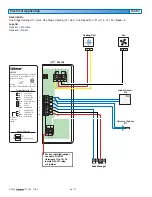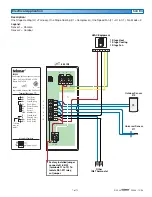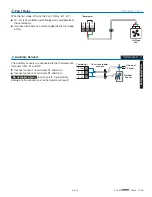
©
2008 W
544
-
12/08
2
of
12
Defi nitions
The following defined terms and symbols are used throughout this manual to bring attention to the presence of hazards of
various risk levels, or to important information concerning the life of the product.
– Caution: Refer to accompanying documents.
– Caution: Refer to accompanying documents.
INSTALLATION
CATEGORY II
– Local level appliances.
Caution
Improper installation and operation of this control could result
in damage to the equipment and possibly even personal
injury or death. It is your responsibility to ensure that this
control is safely installed according to all applicable codes
and standards. This electronic control is not intended for
uses as a primary limit control. Other controls that are
Choose the placement of the thermostats early in the
construction process to enable proper wiring during
rough-in.
Consider the following:
•
Interior Wall
•
Keep dry. Avoid potential leakage onto the control.
RH 80% to 88°F (31°C), down to 50% from 104 to
122°F (40 to 50°C). Non-condensing environment.
•
No exposure to extreme temperatures beyond 32 - 122°F
(0 - 50°C)
•
No draft, direct sun, or other cause for inaccurate
temperature readings.
Rough-In Wiring
Sensor 2
Sensor 1
Fan 1
2 Cond. / 18 AWG
2 Cond. / 18 AWG
2 Cond. / 18 AWG
2 Cond. / 18 AWG
4 Cond. / 18 AWG
1st Stage Cool
Note:
When multiple wires
run to the same equipment
location, wiring conductors
can share one wire jacket.
1st Stage Heat
24 V (ac) Power
tN4 Network
Zone Manager
•
Away from equipment, appliances, or other sources of
electrical interference.
•
Easy access for wiring, viewing, and adjusting the display
screen.
•
Approximately 5 ft. (1.5 m) off the finished floor.
Use standard 18 AWG wire for the thermostat power, stages
tN4 and sensor connections.
Refer to the diagram below to determine the number of
conductors to run from each piece of equipment to the
thermostat location.
intended and certified as safety limits must be placed into
the control circuit. Do not attempt to service the control.
Refer to qualified personnel for servicing. Apart from any
field replaceable fuse(s) there are no user serviceable
parts. Attempting to do so voids warranty and could result
in damage to the equipment and possibly even personal
injury or death.






























